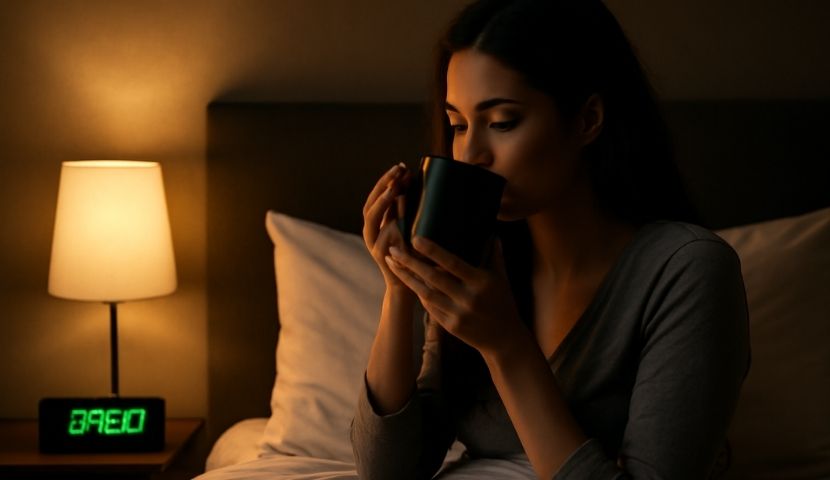Coffee is more than just a beverage; it’s a ritual, a source of comfort, and for many, a daily necessity. But what happens when that comforting cup is consumed at midnight? Is it detrimental to your health or sleep quality?
As coffee lovers in the USA cherish their brew at all hours, it’s important to understand the science behind caffeine metabolism, the impact of midnight coffee consumption, and how it affects your body and mind. Let’s uncover the truth.

Understanding Caffeine and Its Effects
What Is Caffeine?
Caffeine is a natural stimulant predominantly found in coffee, tea, chocolate, and some sodas. It works by blocking adenosine receptors in the brain—a neurotransmitter that promotes sleep and relaxation—thereby reducing feelings of tiredness and boosting alertness.
Fun Fact: The average cup of coffee contains about 95 mg of caffeine, but this can vary depending on the brew and brand.
How the Body Processes Caffeine
Once consumed, caffeine is quickly absorbed into the bloodstream and reaches peak levels in about 30 to 60 minutes. However, the elimination process, called caffeine metabolism, differs widely among individuals. The caffeine half-life—how long it takes for half of the caffeine to be processed and removed—can range between 3 to 5 hours, but some people metabolize it much slower due to genetics or medication use.
| Factor Affecting Caffeine Metabolism | Effect on Caffeine Half-Life |
|---|---|
| Genetics | Can slow or speed metabolism |
| Age | Older adults metabolize slower |
| Smoking | Speeds up metabolism |
| Pregnancy | Slows down metabolism |
| Medications | Some drugs inhibit caffeine breakdown |
This means that a cup of coffee consumed at midnight might still be stimulating your nervous system in the early morning hours.
The Impact of Midnight Coffee Consumption
Disruption of Sleep Patterns
One of the most notable consequences of drinking coffee at midnight is sleep disruption. Caffeine is well known to delay the onset of sleep and reduce overall sleep quality. According to a study in the journal Sleep, caffeine consumed up to six hours before bedtime can reduce total sleep time by more than an hour.
- Delayed Sleep Onset: Difficulty falling asleep.
- Reduced Deep Sleep: Less restorative slow-wave sleep.
- Increased Nighttime Awakenings: More frequent disruptions.
This effect leads to daytime sleepiness, irritability, and reduced cognitive performance.
Effects on the Circadian Rhythm

The circadian rhythm is the body’s internal clock that regulates sleep-wake cycles and many physiological processes over 24 hours. Caffeine intake late at night can shift or disrupt this rhythm, leading to misalignment between your biological clock and the external environment.
This disruption can cause:
- Difficulty waking up in the morning.
- Daytime fatigue.
- Long-term sleep disturbances.
Health Risks Associated with Late-Night Coffee
Increased Heart Rate and Blood Pressure
Caffeine is a stimulant that activates the sympathetic nervous system, often called the “fight or flight” response. This activation increases heart rate and blood pressure temporarily. For some, especially those with underlying heart conditions, late-night caffeine intake can prolong these effects, leading to discomfort and insomnia.
Anxiety and Nervousness
Caffeine can increase the release of stress hormones like cortisol and adrenaline. High doses or consumption late in the day can cause:
- Heightened anxiety
- Nervousness
- Restlessness
This is especially true for individuals with caffeine sensitivity, who may experience these effects at lower doses.
Digestive Issues
Caffeine stimulates gastric acid secretion, which may cause:
- Acid reflux
- Heartburn
- Indigestion
When consumed late at night, these symptoms can worsen and interfere with sleep comfort.
Who Should Avoid Midnight Coffee?
Certain groups should be extra cautious or avoid drinking coffee at midnight altogether:
| Group | Reason |
|---|---|
| Pregnant Women | Slower caffeine metabolism can affect fetal development |
| Individuals with Heart Conditions | Risk of arrhythmias and increased blood pressure |
| People with Sleep Disorders | Caffeine can worsen insomnia and sleep quality issues |
| People with Anxiety Disorders | Risk of exacerbated anxiety symptoms |
The Complex Relationship Between Coffee and Sleep

Coffee and Insomnia
The relationship between caffeine and insomnia is well-documented. Caffeine blocks adenosine receptors, preventing the brain from feeling sleepy. This mechanism can cause or worsen caffeine-induced insomnia, characterized by:
- Difficulty falling asleep.
- Fragmented sleep.
- Non-restorative sleep.
Sleep Disruption vs. Alertness: Finding the Balance
While caffeine provides an energy boost at night by increasing alertness and concentration, this comes at a cost for sleep quality. According to Dr. Michael Breus, a clinical psychologist and sleep specialist:
“The stimulating effects of caffeine can be beneficial for short-term alertness but detrimental to sleep architecture and circadian rhythm if consumed too late.”
Tips for Enjoying Coffee Without Disrupting Sleep
If you love your midnight cup, here are some strategies to minimize adverse effects:
1. Opt for Decaffeinated Coffee
Decaf coffee contains only trace amounts of caffeine and allows you to enjoy the flavor without stimulation.
2. Set a Cut-Off Time
Try to consume your last caffeinated coffee at least 6 hours before bedtime to allow enough time for metabolism.
3. Monitor Your Body’s Response
Everyone’s caffeine tolerance varies. Pay attention to how your body reacts to late caffeine and adjust accordingly.
4. Consider Alternatives
If you crave a warm drink at night, try herbal teas like chamomile or peppermint, which promote relaxation.
Table: Caffeine Content in Common Beverages
| Beverage | Average Caffeine Content (mg) |
|---|---|
| Brewed Coffee (8 oz) | 95 |
| Espresso (1 oz) | 63 |
| Black Tea (8 oz) | 47 |
| Green Tea (8 oz) | 28 |
| Cola (12 oz) | 34 |
| Decaffeinated Coffee (8 oz) | 2 |
The Pros and Cons of Drinking Coffee at Night
| Pros | Cons |
|---|---|
| Temporary increase in alertness | Disrupted sleep cycles |
| Improved concentration | Increased anxiety and nervousness |
| Possible mood enhancement | Increased heart rate and blood pressure |
| Enjoyment of coffee ritual | Risk of caffeine addiction |
Coffee Dependency and Moderation
Repeated late-night coffee consumption can lead to caffeine dependency, characterized by tolerance (needing more caffeine to get the same effect) and withdrawal symptoms like headaches and fatigue. Moderation is key to enjoying coffee without negative lifestyle impacts.
Conclusion
Drinking coffee at midnight isn’t inherently “bad,” but for most people, it can negatively impact sleep quality and overall health due to caffeine’s stimulating effects. By understanding caffeine metabolism, its impact on sleep and the circadian rhythm, and knowing your body’s tolerance, you can make informed choices.
Whether it’s switching to decaf, setting a caffeine cut-off time, or moderating intake, it’s possible to enjoy coffee without sacrificing restful sleep. Balance and mindfulness are the ultimate keys for coffee lovers who crave that late-night brew.



0 Comments